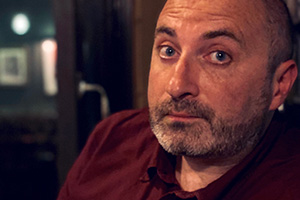Falmouth master's course graduates on why you should study comedy writing
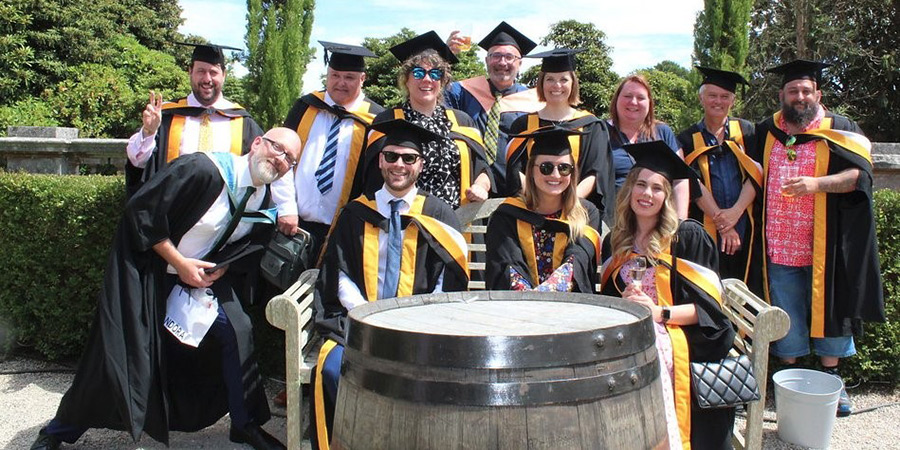
Hello there. Simon Nicholls here. I'm an award-winning TV and audio comedy producer, writer and course leader for the master's in Comedy Writing at Falmouth University, taught online and part time. I'm running a live Q&A about the MA on Wednesday 6th December, which you can join here.
I've previously written articles for British Comedy Guide about comedy writing, including Dos and Don'ts for New Comedy Writers and pointers on what to do before you start writing a sitcom.
I'm back, and this time I've brought some friends; sharing the experiences from five of the MA's alumni who've gone on to do amazing things in the world of comedy writing and production. So without further ado, introducing:
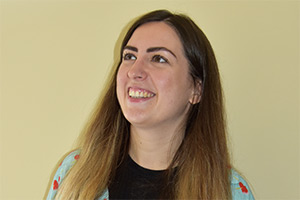
Jade Gebbie secured the prestigious position of staff comedy writer for BBC Studios Audio, whilst studying on the MA. A successful stand-up, Jade currently has a comedy script in development with BBC Studios Audio, and writes on comedy panel and sketch shows. Jade is polishing her scripts from the MA to pitch to TV, and has recently finished writing a short film.
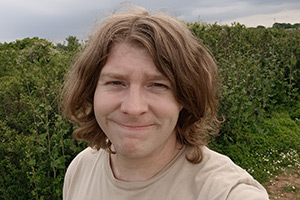
Sean Phelan was one of the three finalists at this year's BAFTA Rocliffe New Writing Showcase with Growing Pains - a script Sean wrote on the MA. Sean is now in talks with production companies for the script, as well as developing new ideas.
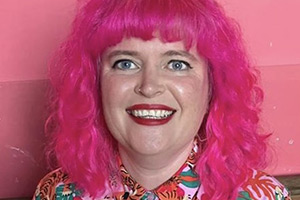
Rosie Šošić secured paid writing credits on BBC audio sketch shows during her time on the MA, and recently came 3rd in this year's Cornish Comedian of the Year. Rosie has recently moved to Liverpool and is developing new projects, including a script from the MA about people's obsession with cold-water swimming.
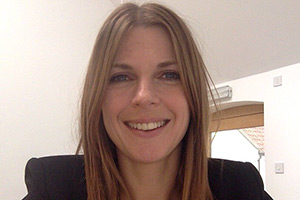
Nicky Roberts has also had several recent writing credits on BBC comedy series, including The Skewer, Dead Ringers, Nature Table and current BBC panel show Best Medicine, hosted by Kiri Pritchard-McLean. Nicky is juggling writing on these shows with developing her own narrative series.
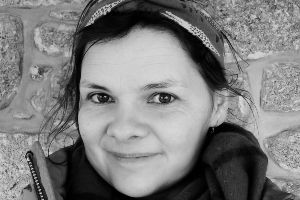
Jane Harvey is a Cornish writer who recently wrote on BBC Radio 4 sketch show, Wosson Cornwall. Jane has recently pitched for funding to make a short film and is in active development with producers on her own projects.
So here they are, in their own words...
Why did you want to study a master's in the first place?
Jade: I'm obsessed with comedy, whether it's stand-up, sitcom or character. I've always loved TV comedy especially; with sitcoms and comedy dramas making up about 99% of my TV intake. I'd tried to write scripts (badly) and wrote topical jokes for open door shows (slightly less badly). I realised how much I loved comedy writing (far more than my job working for a tech company), so when I read about this course it seemed the perfect way to learn.
Nicky: I wanted to finally take my comedy writing seriously, and knew if I signed up to the MA and made that commitment I'd have multiple projects and contacts at the end of it. Plus, I knew the fear of public failure would make me get off my butt once I'd told everyone I was doing the course!
Sean: I knew I wanted to do a master's but I needed it to be something I loved; and comedy writing really ticked that for me. I'd always been told that I should be a stand-up, but I find the thought of that absolutely terrifying... so chose writing comedy instead.
What made you choose Comedy Writing at Falmouth?
Jane: The course is online and part-time, which meant I could manage study with work and children. Watching, reading and listening to comedy has always been a huge passion of mine and the prospect of honing my writing, as well as gaining an in-depth knowledge of how to enter the industry, was so appealing.
Jade: I chose this MA because I was looking for something to teach me structure for long form sitcoms and sketches. I also thought that the variety of different modules would help me to widen my skill set. I wanted to finish the course with a strong portfolio and a variety of different types of sitcoms to show producers which the MA allowed me to do.
Nicky: I chose this one mainly because of Simon and the other tutors - it's so important to be taught by professionals still active in the industry. And this comedy course worked for me because of the flexibility/remote learning - I live in Bath and have a day job, so the London courses were a no-go.
Rosie: I really wanted to do a course that was industry focused, run by industry professionals, which is exactly what the course is.
How was studying something like comedy writing online?
Rosie: It was great to be able to meet and exchange ideas with people all over the world: a writing career no longer means you have to live in London.
Jane: Oddly enough, I've gained more friendships through this online course than I did during my 'in-house' degree. From the very beginning, students are strongly advised to share work with each other and give constructive feedback. At first I felt quite vulnerable putting my work out there, but cannot recommend throwing yourself into this process enough. Not only does it improve your writing, but helps to build those crucial connections. The regular drop-ins and webinars also bring you together as a team.
Sean: It was perfect. The online aspect of the course allowed me to balance my job with studying. All the lectures are pre-recorded, so if I was ever at work during one I could catch up the following day.
What were the best bits?
Sean: I very much enjoyed the collaborative module where you work with other students: we certainly had a giggle during our weekly meetings. Everyone on the course wants to be the best comedy writer they can be, and the weekly forums really help you have an extra pair of eyes, ears and without sounding too zombie-like... braaains!!
Nicky: Having deadlines and knowing an expert was going to read and critique your work was so valuable. The tutors were always up for reading scripts, so were fellow students! A real highlight was when I managed to bag an interview with my comedy hero, Chris Morris, as part of the industry module. He's quite elusive and basically never gives interviews, so he obviously thought the MA sounded like a cool thing!
Jade: There were many things about the MA which I loved. One was developing a really wide range of ideas, and doing this helped me to find my own comedy voice. Another thing I enjoyed was meeting so many different people; despite the course being online, I've had material on BBC's The Skewer and Breaking The News with one of my fellow MA-er's Owen Pullar, and regularly meet up with quite a few different people from the course: whether online or in 'real life'. I even MC'd one of the first stand-up gigs one of my course mates did, and since then we've become good friends, regularly bouncing ideas off of each other.
Rosie: I loved all the modules, but the collaborative module set me up with friends for life, and showed me how four heads are definitely better than one. I'm still writing with several people from that module.
Jane: This is a tricky one, as I honestly loved the whole process. I began knowing nothing about the industry and finished officially calling myself a professional comedy writer. I've left with a portfolio of work which - with a few tweaks - is industry-ready thanks to the support and feedback from the tutors.
What was the most valuable thing you've learned?
Jane: Rule number one: don't be a dick. Can I say that? Any giant egos will be a major no-no in a writers' room. There are enough talented people who want to do this for a living, that being a decent human being gives you a head start. Of course, learning about character archetypes, formatting scripts and how to write pitch documents are all invaluable, but rule number one always stuck with me.
Sean: It might sound really basic, but the first lecture of the first unit blew my mind: I had never clocked that all strong comedy characters have flaws! It goes to show how green I was at the beginning. The industry unit also gives you a good head start in what the professional comedy world actually entails. Some courses drop you off at the deep end, but this MA arms you with the tools to really break into the industry.
Jade: One of the most important things I learnt is that whilst writing is often a solo activity, everyone benefits from collaboration. Whether this is as a writing partnership or getting and giving feedback it all helps to make a piece of work as strong as possible. Now I'm working with producers on scripts and in writers' rooms, I know that being able to take notes is crucial. The MA sets people up for this by having online forums to give and get notes.
Nicky: Self-motivation! Keep going! Simon and the team are super supportive, as are your fellow students. It was also useful to learn how to approach and talk to producers - as Simon is a producer he can give you lots of insider tips on that.
How did the course help you develop as a professional comedy writer?
Nicky: Confidence and contacts. Since completing the MA and getting several commissioned jobs I feel like a legitimate comedy writer - I think that can be hard for some people to really own and believe that if they just start writing speculative scripts at home without progress. The MA has made it real for me.
Jade: Before the MA, I had no clue how to structure a script or really develop an idea. I had things I tried to write and ideas I wanted to work on, but I didn't fully realise the importance of planning and developing characters before starting out. Now I know how to plan. And even if that stage takes weeks or even months, it means when the time comes to write the script I have a world built, a direction to take the characters and the knowledge that the script isn't going to trail away into a void of "what on earth shall I write now?"
Sean: Getting in depth feedback is soooooooooo helpful. The notes the lecturers give are all easy to digest and come from a place of experience. Receiving real feedback means you can hone your writing.
Jane: The course has given me the confidence and the self-belief that I can do this. Not only that, but I now have a core understanding of how the industry works: the masterclasses give an incredible insight into that world from top agents' perspectives to the best comedy actors and writers. The tutors are all successful in their own right and pass on such valuable advice and feedback. I feel like I've been given all the tools I need for entering the industry: the rest is up to me.
Rosie: As well as gaining credits on the 'open door' shows, I was fortunate enough to work on Wosson Cornwall for Radio 4. This was a fantastic opportunity where I met an amazing group of writers and comedians who have been nothing but supportive in helping me gain more experience in the field. Without doing the course, and being a part of that writers' room, I never would have started stand-up comedy, where I came 3rd in Cornwall Comedian of the Year! Doing the MA really has opened so many doors for me.
Let's talk cash: has it been a good investment?
Jane: Absolutely. Financially, I received the full postgraduate student loan, an early application discount and two grants from charitable trusts I applied for once I had started studying. I left with a Distinction, professional writing credits, writing partners, an extensive portfolio of work and the beginnings of a new career. I went into this hoping to find myself again after years of caring for others and I've succeeded in that; I feel fulfilled and optimistic for the future.
Sean: Yes. Without this course I would absolutely not have won the BAFTA Rocliffe New Writing Competition, and definitely wouldn't be talking to a few TV channels. It is the single best decision I have ever made, although it doesn't have a great deal of competition given the rest of my life choices...! If you're willing to put in the work and take advantage of the course then the comedy world is your oyster... just don't be shellfish (sorry I couldn't help myself).
If you'd like to learn more about become a real master of comedy, take a look at Simon's online Comedy Writing master's course at Falmouth University. Simon is also running a live Q&A on Wednesday 6th December, which you can join here.
About Simon Nicholls
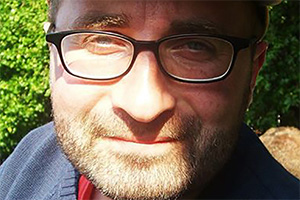
With the comedy industry needing new, diverse and regional writing talent, top comedy producer and former BBC Studios comedy exec Simon Nicholls has devised a Master's course in Comedy Writing for Falmouth University. It's an online MA, so you can be based anywhere whilst you study.
Across the part-time MA, Simon teaches everything he's learnt from being an award-winning comedy producer for 20 years, working closely with and learning from great writers and producers. The course includes writing tips and career guidance masterclasses from the very best in the industry, including Emmy and BAFTA-winning comedy writer Simon Blackwell, BAFTA-winning writer/director/performer Holly Walsh, multi-award-winning writer of The Vicar Of Dibley Paul Mayhew-Archer, BAFTA-winning Mitchell & Webb comedy producer Gareth Edwards, former Head of BBC and Sky Comedy Commissioning Lucy Lumsden, and co-creator of Sky comedy Trollied and co-writer of Sky comedy Bloods, Paul Doolan. Dawn French - the Chancellor of Falmouth University - is backing the course... indeed there is a comedy masterclass courtesy of legends French & Saunders too.
This article is provided for free as part of BCG Pro.
Subscribe now for exclusive features, insight, learning materials, opportunities and other tools for the British comedy industry.

